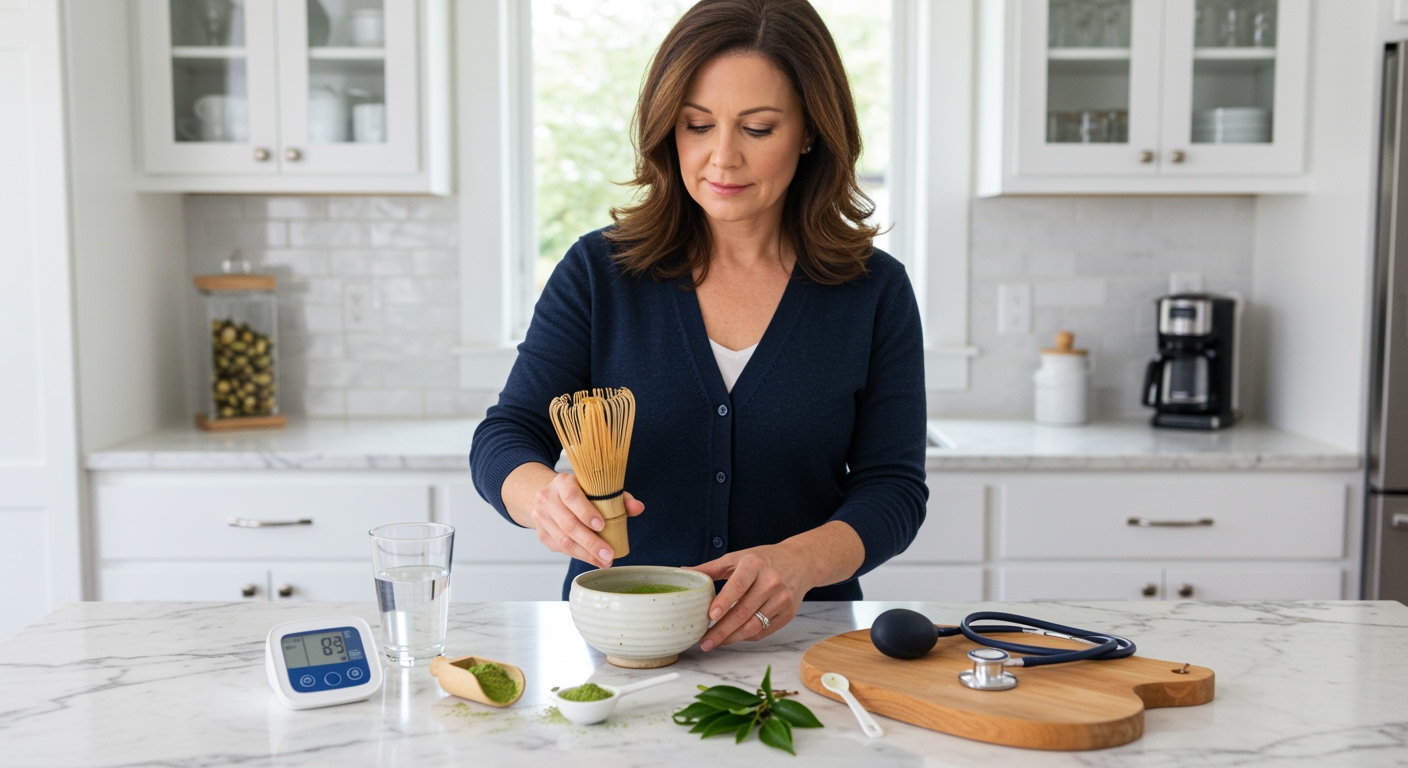✪ Key Takeaway: Matcha tea can help lower blood pressure through antioxidants and L-theanine, but caffeine content may cause temporary spikes.
Introduction
Your morning matcha ritual might be doing more for your heart than you realize.
You probably started drinking matcha for the energy boost or Instagram-worthy green color, but now you wonder if this trendy powder actually helps with your blood pressure concerns.
Hi, I’m Abdur, your nutrition coach and today I’m going to explain exactly how matcha affects your blood pressure and whether you should make it part of your heart-healthy routine.
What Makes Matcha Different From Regular Green Tea?
Matcha contains up to 137 times more antioxidants than regular green tea because you consume the entire leaf, not just the brewed water.
The stone-grinding process breaks down cell walls and releases concentrated compounds that would otherwise remain locked inside the tea leaves.
This powder form delivers a powerful dose of catechins, particularly EGCG (epigallocatechin gallate), which directly impacts your cardiovascular system.
The shade-growing technique used for matcha plants increases chlorophyll and amino acid content, creating a unique nutritional profile that sets it apart from other teas.
Your body absorbs these concentrated compounds differently than regular tea, leading to more pronounced effects on blood pressure regulation.
✪ Fact: One cup of matcha provides the antioxidant equivalent of 10 cups of regular green tea.
How Does Matcha Actually Lower Blood Pressure?
The EGCG catechins in matcha work by relaxing your blood vessel walls through a process called vasodilation.
These compounds increase nitric oxide production in your endothelium, the thin layer of cells lining your blood vessels.
When nitric oxide levels rise, your blood vessels naturally widen, reducing the pressure needed to pump blood throughout your body.
Matcha also contains L-theanine, an amino acid that promotes relaxation and counteracts stress-induced blood pressure spikes.
Research shows that people who drink matcha regularly experience significant reductions in both systolic and diastolic blood pressure over time.
The anti-inflammatory properties of matcha help protect your arteries from damage that leads to stiffening and increased blood pressure.
✪ Pro Tip: Drink matcha 30 minutes before meals to maximize its blood pressure benefits.
Can The Caffeine In Matcha Raise Your Blood Pressure?
Matcha contains about 70 milligrams of caffeine per cup, which is less than coffee but more than regular green tea.
This caffeine can cause temporary blood pressure increases within 30 minutes of consumption, especially if you are caffeine-sensitive.
However, the L-theanine content in matcha creates a unique buffering effect that prevents the jittery response typical of other caffeinated beverages.
Studies show that while matcha may cause short-term blood pressure elevation, the long-term effects are consistently beneficial for cardiovascular health.
The key difference lies in how your body processes matcha caffeine compared to coffee caffeine due to the presence of other bioactive compounds.
If you have uncontrolled hypertension, monitor your blood pressure response when first introducing matcha to your routine.
✪ Note: The caffeine spike from matcha typically lasts only 1-2 hours before beneficial effects take over.
What Does The Research Say About Matcha And Blood Pressure?
A comprehensive study published in the American Journal of Clinical Nutrition found that regular green tea consumption reduced systolic blood pressure by 2.6 mmHg on average.
Since matcha contains significantly higher concentrations of active compounds, researchers believe the blood pressure benefits are even more pronounced.
Japanese population studies show that people who consume matcha daily have lower rates of hypertension compared to those who drink other beverages.
Clinical trials demonstrate that 12 weeks of consistent matcha consumption can lead to measurable improvements in cardiovascular markers.
The research consistently shows that the antioxidant activity of matcha translates into real-world blood pressure improvements for most people.
However, individual responses vary based on genetics, existing health conditions, and overall dietary patterns.
✪ Fact: Studies show matcha benefits become most apparent after 8-12 weeks of regular consumption.
How Much Matcha Should You Drink For Blood Pressure Benefits?
Most research suggests 1-2 cups daily provides optimal blood pressure benefits without excessive caffeine intake.
Start with half a teaspoon of matcha powder per cup and gradually increase to one full teaspoon as your body adapts.
The timing matters more than the exact amount – drinking matcha consistently at the same time each day maximizes its cardiovascular benefits.
Avoid drinking matcha late in the day since the caffeine can interfere with sleep quality, which directly impacts blood pressure regulation.
If you take blood pressure medications, space your matcha consumption at least 2 hours apart from your medication to avoid interactions.
Quality matters significantly – choose ceremonial grade matcha for maximum antioxidant content and minimal processing additives.
✪ Pro Tip: Prepare matcha with water below 175°F to preserve heat-sensitive antioxidants.
The Bottom Line
Matcha tea can be a valuable addition to your blood pressure management strategy when consumed regularly and mindfully.
The best medicine is often the simplest – consistent small changes create the biggest health transformations.
I would love to hear about your experience with matcha and blood pressure in the comments below – share your questions, results, or concerns so we can learn from each other.
References
At NutritionCrown, we use quality and credible sources to ensure our content is accurate and trustworthy. Below are the sources referenced in creating this article:





